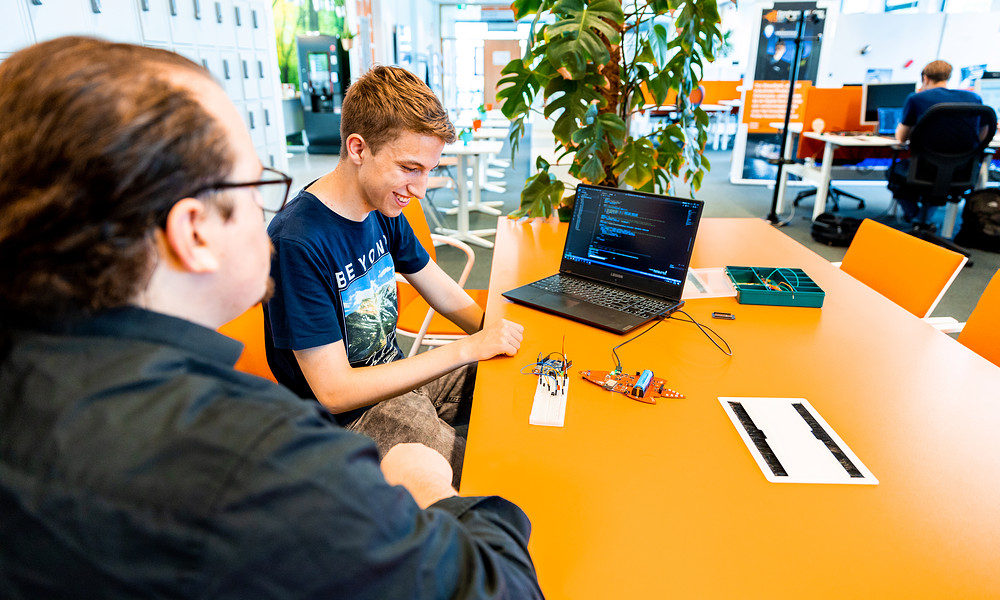AI and Your Future Profession

AI and Your Future Profession
- Level
- Language
- English
- Credits
- 30 ECTS
- Startmonths
- Start: February, September
- Locations
- Groningen
Do you want to prepare for the future in which you will have to deal with AI and data in your profession? Do you want to be able to use the power of data to become a better professional? Will your future job change drastically through the use of data and algorithms? And how can you also ensure that these algorithms are applied fairly and transparently?
About this exchange programme
Artificial intelligence (AI) and data are all around us nowadays; think of the face ID on your phone, the recommendations of Netflix, the advertisements you see on social media and the chatbot of your health insurer. Professionally, too, you will undoubtedly come into contact with the impact of AI and data in more or fewer ways. For example:
- Can we predict the recurrence of leukaemia?
- How much care does a patient need based on their Apache IV score?
- How can we get better image recognition with less use of contrast fluid in MRI scans by AI?
- Which students hand in their public transport card on time?
- When are types of advertisements (online, physical, analogue) most effective?
- Which clients run an additional risk of getting a bailiff at the door?
- What is the right energy mix of a building, and when should which rooms be heated?
Do you want to prepare for the future in which you will have to deal with AI and data in your profession? So that you can use the power of data to become a better professional? Will your future job change drastically through the use of data and algorithms? And how can you also ensure that these algorithms are applied fairly and transparently?
Course
Project Part 1
Credits
10
Content
You work in a learning community on a group project assignment for a client from our network. Depending on the assignment and your personal learning plan, you can delve into specific AI applications such as image recognition, autonomous systems (e.g., self-driving cars), judiciary, data-driven business models, AI in games, etc.
Course
From Data to Value
Credits
5
Content
In this practical course, you will learn the basics of data collection, processing, visualization, and analysis. You will work firsthand with tools that are suitable for your technical level, and you will select a dataset from your field in consultation with the instructors. Ideally, a research group from your school will also be involved in this course.
Course
Project Part 2
Credits
10
Content
You continue working on your project in our learning community. Depending on the assignment and your personal learning plan, you can delve into specific AI applications such as image recognition, autonomous systems (e.g., self-driving cars), judiciary, data-driven business models and AI in games.
Course
My Future Profession
Credits
5
Content
As a student, you bring in questions and experiences from your own field. What are the most relevant AI and Data Science developments in your field? What different techniques are used to collect en process data in your field? What Machine Learning models are used in your future profession? Where did these techniques come from and what are the latest developments? Through examples, you will learn the different concepts and applications. Using guest lectures from various experts, we will explore how AI and data science are applied in healthcare, business, and government. We pay special attention to the ethical aspects of using AI. You will end the course by conducting an analysis of the impact of AI applications in your professional field.
Before you can start
- This programme is open to all Hanze students, students of other universities of applied sciences in the Netherlands (KOM) and exchange students. You should have some affinity with data and be handy with software.
- For questions about the content of this programme, please contact the coordinator via the ‘Contact & FAQ’ tab above.
Admission & application
Please check with your home university whether there is an agreement set up with the Hanze School that is offering the exchange programme of your choice. To apply for and be admitted for our exchange programme you should take the following steps
-
1. Be nominated by your home university
Once you have been nominated, your nomination will be checked by us and confirmed to your home university by email. You will receive your application link during our application period.
-
2. Submit your online application
Once you have been nominated by your home university you will receive a personal application link and the application instructions during our application period. The application is fully digital and documents do not have to be send by email or postal mail. Make sure you do not miss our application deadline!
-
3. Letter of Acceptance
Once you have submitted your application we will check your documents. If you have to re-submit any documents, we will let you know. We will be sending out Acceptance Letters from the beginning of May when you start in September and from the middle of October when you start in February.
Find out more about our application process and practical matters.
Frequently Asked Questions
Contact
-
Lech Bialek
Onderzoeker



